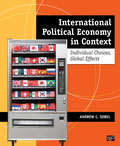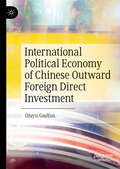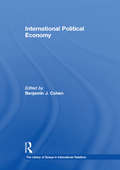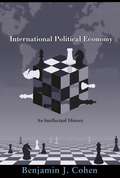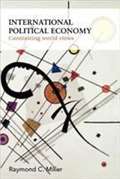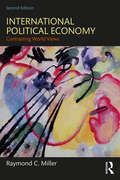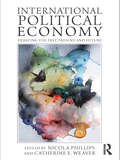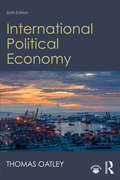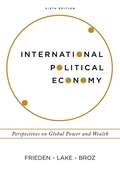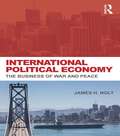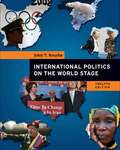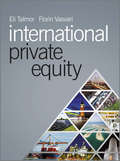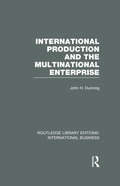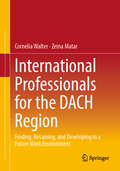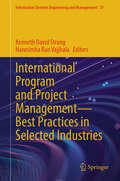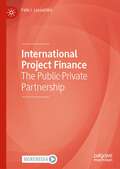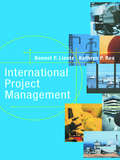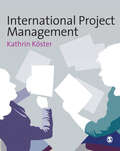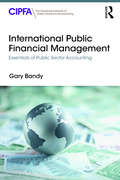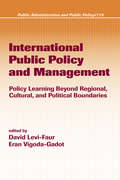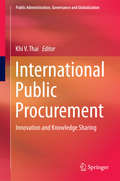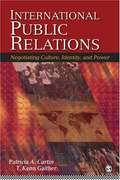- Table View
- List View
International Political Economy in Context: Individual Choices, Global Effects
by Andrew C. SobelAlthough many international political economy texts offer good descriptions of what events have occurred in global economic and political relations, they make little attempt to develop explicit theoretical frameworks explaining why. Andrew Sobel′s International Political Economy in Context: Individual Choices, Global Effects takes a micro approach to international political economy that considers the fact that individuals—not nations—make choices. Grounding policy choices in the competitive environs of domestic politics and decision-making processes, Sobel illustrates how policymakers choose among alternatives, settling on those that are most in sync with their self-interest. The book is structured to build students′ skills for a sophisticated understanding of how and why events unfold in the international political economy. Students become versed in the primary assumptions and structural/macro conditions of economic and political geography in the global arena. An examination of micro-level conditions and mechanisms introduces the factors that influence political and economic outcomes. Students are then able to use those primary assumptions and micro-level arrangements to make sense of past and present changes in the global political economy. Those familiar with Sobel′s first volume, Political Economy and Global Affairs, will easily find their way through this new book. Anyone looking for a compelling, accessible, and fully integrated rational choice perspective on international political economy will find it here.
International Political Economy of Chinese Outward Foreign Direct Investment
by Qiuyu GaoYanThis book centers on the political economy behind the internationalization of Chinese multinational enterprises (MNEs). Special attention has been given to the role of political-sided considerations and state policies in their investment strategies during the &“stable period&” (2006 to 2017) when Chinese Outward Foreign Direct Investment (OFDI) witnessed substantial growth, even as the entire world was relatively friendly towards Chinese MNEs. The author uses scientific methods to develop Country Political Risk Index (CPRI)—the first composite index that captures how Chinese MNEs perceive political risk in host countries when making investment decisions, applies it to China Global Investment Tracker (CGIT) dataset developed by American Enterprise Institute (AEI) and interprets the reasons behind the political risk distribution of Chinese OFDI from the standpoint of China&’s holistic approach to national security. Offering by a young scholar with practical experience in business consultancy and M&A projects, this book can help researchers, diplomats and business people better understand how China&’s FDI-related policies empowered Chinese MNEs to venture overseas and emboldened them in the face of unstable investment environments.
International Political Economy: A Reader
by Tsuneo Akaha Kendall W. Stiles"International Policy Economy: A Reader" presents discussions of economic policy issues most frequently addressed by International Policy Economy (IPE) analysts and policy makers: trade, finance, investment, and aid. These policy concerns need to be understood against the backdrop of broad global trends such as changing international leadership patterns, structural changes in the world economy, increasingly crucial relationships between economics and national and international security, and international order.
International Political Economy: An Intellectual History (The Library of Essays in International Relations)
by Benjamin J. CohenPrior to the 1970s, few serious efforts were made to bridge the gap between economics and political science in the study of international relations. Systematic scholarly analysis of International Political Economy (IPE), emphasizing formal integration of elements of orthodox market and political analysis, is really of very recent origin. This volume brings together some of the most important research papers published in the modern field of IPE since its birth less than four decades ago, emphasizing work that has significantly advanced theoretical and analytical understandings. Coverage includes grand questions of systemic transformation and system governance as well as more narrowly focused explorations of the two most central issue-areas of the world economy, trade and money and finance. The introductory essay locates this selection of articles in the context of the field's broad evolution and development to date.
International Political Economy: An Intellectual History (The\library Of Essays In International Relations Ser.)
by Benjamin J. CohenThe field of international political economy gained prominence in the early 1970s--when the Arab oil embargo and other crises ended the postwar era of virtually unhindered economic growth in the United States and Europe--and today is an essential part of both political science and economics. This book offers the first comprehensive examination of this important field's development, the contrasting worldviews of its American and British schools, and the different ways scholars have sought to meet the challenges posed by an ever more complex and interdependent world economy. Benjamin Cohen explains the critical role played by the early "intellectual entrepreneurs," a generation of pioneering scholars determined to bridge the gap between international economics and international politics. Among them were brilliant thinkers like Robert Keohane, Susan Strange, and others whose legacies endure to the present day. Cohen shows how their personalities and the historical contexts in which they worked influenced how the field evolved. He examines the distinctly different insights of the American and British schools and addresses issues that have been central to the field's development, including systemic transformation, system governance, and the place of the sovereign state in formal analysis. The definitive intellectual history of international political economy, this book is the ideal volume for IPE scholars and those interested in learning more about the field.
International Political Economy: Contrasting World Views
by Raymond C. MillerAn essential read on international political economy, global governance and international economics, this book provides illustrative case studies, classical and contemporary debates with historical and theoretical explanation.
International Political Economy: Contrasting World Views
by Raymond C. MillerThe second edition of International Political Economy continues to be the perfect short introduction to the fundamental theories and issues of international political economy (IPE). Written in a concise, accessible style by an experienced teacher and scholar, it combines theoretical perspectives, real-world examples, and comparative policy analysis. The text offers students an in-depth, balanced understanding of the contrasting core perspectives in IPE, allowing them to critically evaluate and independently analyze major political-economic events. Having emerged from both the classical and modern schools of political economy, the book’s unique structure is organized around the threefold world view classification of IPE that the author labels as free-market, institutionalist, and Marxist. The book: Compares, contrasts, and critiques the different approaches in the context of major global issues such as financial crises, free vs. fair trade, ecological degradation, growing inequality, gender, globalization, and multinational corporations; Explains key economic concepts such as financial markets, banking systems, monetary policy, foreign exchange, Keynesian economics, fiscal policy, comparative advantage, value theory, money, role of corporations, and ecological economics as well as their relationship to political concepts such as international regimes and governance; Contains 30 original figures and tables, review questions at the end of each chapter, and a detailed glossary to enhance student learning; Responds to the call from eminent IPE specialists Robert Keohane and Benjamin Cohen for textbooks that take a pluralistic approach. This thoroughly updated second edition is essential reading for students of international political economy, economics, political science and global governance.
International Political Economy: Debating the Past, Present and Future
by Nicola PhillipsThe book gathers together a set of lively, provocative essays by leading voices in International Political Economy to debate the evolution of the field, its current state and its future directions. Prompted by recent commentaries on the existence of a ‘transatlantic divide’ in IPE between an ‘American school’ and a ‘British school’, the essays provide a wide-ranging discussion of whether it is useful to think of the field in these terms, what the ‘American’ and ‘British’ schools look like, what their achievements and shortcomings are, and what are the desirable future directions for IPE scholarship. The diverse responses to these questions reflect the ongoing vibrancy and diversity of the field of IPE, and open up an imaginative and engaging discussion about where we need to go from here. Featuring contributions from the most influential scholars in the field from North America, Canada and the UK, this book is essential reading for anyone interested in the cutting edge debates in contemporary international political economy.
International Political Economy: Interests And Institutions In The Global Economy
by Thomas OatleyBroadly viewing the global economy as a political competition that produces winners and losers, International Political Economy holistically and accessibly introduces the field of IPE to students with limited background in political theory, history, and economics. This text surveys major interests and institutions and examines how state and non-state actors pursue wealth and power. Emphasizing fundamental economic concepts as well as the interplay between domestic and international politics, International Political Economy not only explains how the global economy works; it also encourages students to think critically about how economic policy is made in the context of globalization. New to the 6th Edition Covers economic impacts of 2016 electoral events including new Trump administration initiatives related to TPP and NAFTA; UK and Brexit, and the European populist wave. Examines the global financial crisis, EU debt crisis, capital inflows, and development failures. Probes the death of the Doha Round and explores individual trade preferences, WTO dispute settlement, and other trade-related policies and proposals. Considers the question of the Chinese Renminbi as a global currency to displace the dollar.
International Political Economy: Perspectives On Global Power And Wealth
by Jeffry A. Frieden David A. Lake J. Lawrence BrozWith 70 percent new readings, the Sixth Edition of International Political Economy has been extensively updated to reflect changes in the scholarship and the global economy. This compact book brings together a flexible and provocative set of articles and excerpts on a broad range of topics, including the global economic crisis, international migration, and the ongoing challenges in the Eurozone. The text also provides clear introductions and headnotes to help students get the most out of each reading.
International Political Economy: The Business of War and Peace
by James H. NoltThis book offers a completely new and unique introduction to the economics of international relations. It treats all the traditional major themes of international relations theory while giving each a refreshing new twist with the incorporation of the influence of private power, particularly in the realm of war and peace. It reframes the history of the modern global economy and politics by thoroughly purging the myth of the market, a systematic blindness to private power. It not only draws on, but also illuminates major themes and empirical findings of comparative politics, business history, business strategy, business cycle theory, social evolutionary theory as well as the practical wisdom of traders and investors. Part one introduces the major concepts of competing theories of international relations, emphasizing a unique approach, corporatism. Part two introduces the critical importance dynamic and oppositional analysis of issues. Part three traces the rise of the modern world from the mercantilist period until the rise of modern corporate organizations and the demise of imperialism in the crucible of World War I. Part four begins with the origins of the contemporary dominance of business internationalism before and during World War II, then analyzes three major facets of the postwar era: the unification of much of Europe, the industrialization of the Third World, and the Cold War and its aftermath. The final chapter considers the present and future of a fairly peaceful yet economically unstable world. This book presents a refreshing and exciting portrayal of the global economy which challenges every major subject from money to markets to the business cycle. This book eschews the economics of dull averages to restore the drama of contending business forces, struggling for wealth and, in the process, influencing war and peace.
International Politics On The World Stage
by John T. RourkeOne of the leading texts on the IR market, John Rourke's International Politics on the World Stage provides a balanced and comprehensive study of international relations that combines theory, history, and current trends and events. The modern international system, a background history of how it evolved in its present form, as well as transformations that are shaping the 21st century are presented in a straightforward, accessible discussion, without undermining the complexity of world political issues. The text lives up to its reputation of including the latest events and developments of the world stage. Rourke discusses political theory, including contemporary approaches such as constructivism and postmodernism, in the opening chapter. He brings theoretical concepts to life with illustrative examples taken from major current world events, so students see how theory plays out in the real world. The text covers major issues of the twenty-first century, such as the structure of the modern state in the international system, globalisation and the political economy, global security, the rise of intergovernmental and nongovernmental organisations, human rights, and the environment. These topics linked through the chapters in the text give students a grasp of the underlying patterns in world politics, so that they can interpret events they see on the evening news or on the Internet. As in previous editions, the text shows students how politics affects our everyday lives and emphasizes the importance of being politically aware, making informed decisions, and taking responsible action.
International Pricing of Emerging Market Corporate Debt: Does the Corporate Matter?
by Ashoka Mody Sonja KellerA report from the International Monetary Fund.
International Private Equity
by Eli Talmor Florin VasvariBringing a unique joint practitioner and academic perspective to the topic, this is the only available text on private equity truly international in focus. Examples are drawn from Europe the Middle East, Africa and America with major case studies from a wide range of business sectors, from the prestigious collection of the London Business School's Coller Institute of Private Equity. Much more than a simple case book, however, International Private Equity provides a valuable overview of the private equity industry and uses the studies to exemplify all stages of the deal process, and to illustrate such key topics as investing in emerging markets; each chapter guides the reader with an authoritative narrative on the topic treated. Covering all the main aspects of the private equity model, the book includes treatment of fund raising, fund structuring, fund performance measurement, private equity valuation, due diligence, modeling of leveraged buyout transactions, and harvesting of private equity investments.
International Production and the Multinational Enterprise: International Business: International Production And The Multinational Enterprise (rle International Business) (Routledge Library Editions: International Business)
by John H DunningThe growth and impact of the multinational enterprise (MNE) in the post war period is one of the most important phenomena of our time. This volume, originally published in 1981 provides a comprehensive and detailed review of both the theoretical and policy issues at a time when the subject had reached a watershed, after the controversies of the 1970s. The book provides a balanced discussion of major themes such as the development of modern theories of international production; the impact of the MNE on the nation-state and the structure of the international market; the response of governments and the appropriate framework for policy measures; and the historical context and likely future of the MNE.
International Professionals for the DACH Region: Finding, Retaining, and Developing in a Future Work Environment
by Cornelia Walter Zeina MatarThis book presents the necessary resources and practical options for companies to find, bind, and develop international professionals in the DACH region. Through a study conducted by the authors, the interrelationship between Human Resources and internationality is analyzed. The book is organized around the Employee Experience and is suitable for executives, managers, leaders, communication and HR departments, as well as relocation and personnel services.
International Profit Associates
by Thomas J. Delong Ashish Nanda Monica MullickDescribes the work environment, systems, and processes that allow International Profit Associates (IPA) to follow a systematic four-step approach to providing advisory service to small business owners.
International Program and Project Management — Best Practices in Selected Industries (Information Systems Engineering and Management #31)
by Narasimha Rao Vajjhala Kenneth David StrangThis book examines the latest best practices in international program and project management, offering invaluable insights across various industries. Edited by renowned experts, this book brings together a diverse range of case studies and research from leading scholars and practitioners worldwide. From a detailed macro-environmental analysis of contemporary project management to exploring the complexities of AI project management, each chapter highlights critical strategies, tools, and methodologies needed to tackle today's evolving challenges in program and project management. Topics such as ISO standards, ISO 21502, project management body of knowledge (PMBOK), risk management in high-complexity environments, stakeholder management, and agile business intelligence projects are discussed through practical case studies from industries ranging from fintech and biopharmaceuticals to public administration. This book is an essential resource for project managers, researchers, and industry professionals seeking to enhance their understanding of global project management dynamics and apply cutting-edge approaches across sectors. Chapter 7 is available open access under a Creative Commons Attribution 4.0 International License via link.springer.com.
International Project Finance: The Public-Private Partnership
by Felix I. LessamboEconomic growth and development critically depends on the quality of infrastructure. Each aspect of the economy and its infrastructure are linked systemically. Public-Private Partnerships (PPPs) are increasingly being promoted as the solution to the shortfall in financing needed to achieve the Sustainable Development Goals (SDGs). Public-private partnerships enable the public entity to utilize the expertise and efficiencies of the private sector to deliver services and facilities that traditionally have been delivered by the public sector, either through public sector employees or by traditional procurement methods. To be beneficial to all stakeholders, a PPP project requires careful planning, implementation, and strong governance. This book breaks down the steps involved and the traps to circumvent.Despite its globally growing importance, project finance has been somewhat underrepresented in research. This book analyzes project finance from an interdisciplinary perspective—finance, management, and international business—and includes international laws of arbitrage and perspectives of international financial institutions as never endeavored by any previous research projects. The book also includes case studies assessing the relevance of private-public partnerships by comparing the country expectations and the real outcomes. The gap between expectations and results does not necessarily mean that significant progress has not been made. To the contrary, the book suggests that some of the original targets set may have been unrealistic, and that the requisite financial resources—or the financial sector policies that could have generated those resources—may have been lacking.
International Project Management
by Bennet Lientz Kathryn Rea'International Project Management' provides specific guidelines for achieving greater project success. It is the result of 15 years of work on international projects by the authors across various project areas and industries. The authors address a need for modern techniques in project management geared and suited to international projects. They offer lessons learned from failures and problems in international projects, and suggest alternative solutions for project issues. Industry examples include manufacturing, distribution, communications, media, transportation, government, IT, marketing, energy, medical care, tourism, and others in forty countries across five continents. The purpose of this book is to answer: * What is an international project and why is it different? * What are the critical success factors for managing international projects? * How are vendors and outsourcing managed across national boundaries? * How do businesses effectively address cross- cultural, social, and political issues? * How are international communications set up and coordinated? * What should a manager look for in an international project leader? * How does a business select the right vendors for an international project? * How are inadequate or incompatible infrastructure and technology issues overcome? * How are the legal and bureaucratic limitations on project management dealt with?
International Project Management
by Kathrin KosterWith project management becoming an increasingly global endeavour, a comprehensive and international student text that reflects this reality is essential.<P> International Project Management does just that, systematically linking the key elements of cross-cultural management and the particularities of an international context, with the tools and techniques of project management.<P> Key features include:<P> - A wide variety of examples and illustrations, including an in-depth, end-of-chapter case study with case questions;<P> - Student exercises and review questions;<P> - Detailed further reading<P> - The full support of a Companion Website, featuring a Teacher's Manual<P> Visit the Companion Website at www.sagepub.co.uk/koster
International Public Financial Management: Essentials of Public Sector Accounting
by Gary BandyRunning public sector organizations requires specialist accounting and finance skills to overcome the unique challenges of the sector. Citizens rely on their governments to provide a wide range of public services from an inevitably limited budget and therefore the better that the public money is managed the more services that can be delivered. Just as there is no single best way to manage a business there is no single best way to manage public finances. Co-published by the Chartered Institute of Public Finance and Accountancy (CIPFA), the world's leading professional public finance accountancy body, International Public Financial Management: Essentials of Public Sector Accounting provides an expert introduction to public sector accounting and finance. This book was conceived to accompany CIPFA’s International Public Financial Management (IPFM) qualifications as a resource for students that seeks to capture the essential elements of the modules they study, and reflects good practice as put forward by CIPFA in its examination syllabuses. Students of public management and public sector accounting will find this a useful text. Practitioners working in the public sector will also find this concise book vital reading in seeking value for money in providing public services.
International Public Policy and Management (Public Administration and Public Policy)
by Eran Vigoda-Gadot David Levi-FaurAn impressive study of economic, state, social, and international restructuring, International Public Policy and Management explores new patterns and advances in the global integration of policies that result from an ever-increasing pace of shared knowledge, regulations, and norms in countries around the globe. It considers the impact of globalized
International Public Procurement
by Khi V. ThaiSince the 1990s, government at all levels is under increasing pressure to do more with less. However, despite the U. S. government spending about 15 to 20 percent of its GDP on contracts for goods and services, there is a paucity of reference books for public procurement officials and very few textbooks for courses on the subject. Filling this void, the International Handbook of Public Procurement provides the knowledge necessary to understand how procurement works and how to improve the cost-effectiveness of procurement systems. Taking a multidisciplinary approach, the book focuses on the managerial, economic, political, and legal aspects of this topic. It begins with a conceptual framework and highlights various reforms occurring in certain countries. By examining these improvements, readers are able to apply this knowledge to their own strategies. The next section presents selected cases that illustrate the public procurement process, examining systems in various nations including Germany, China, South Africa, Cambodia, Uganda, and Estonia. The book also discusses the rise of electronic procurement systems (E-procurement) and reviews the benefits of these efficient systems. Other topics presented in this comprehensive volume include practical discussions on contract negotiations, bidding, price strategies and cost analysis, and an insightful chapter on the marketOCOs response to contract award announcements. A virtual encyclopedia from numerous international experts, this book was assembled by Khi V. Thai, Professor at Florida Atlantic University and Editor of the Journal of Public Procurement. Dr. Thai has provided technical assistance in the area of public procurement to governments across the world. Empowering those on all sides of the issue, this volume dispenses advice valuable to agovernment officials and contractors, as well as providing a comprehensive text for public administration students.
International Public Relations: Negotiating Culture, Identity, and Power
by Patricia A. Curtin T. Kenn GaitherInternational Public Relations: Negotiating Culture, Identity, and Power offers the first critical-cultural approach to international public relations theory and practice. Authors Patricia A. Curtin and T. Kenn Gaither introduce students to a cultural-economic model and accompanying practice matrix that explain public relations techniques and practices in a variety of regulatory, political, and cultural climates. offers the first critical-cultural approach to international public relations theory and practice. Authors Patricia A. Curtin and T. Kenn Gaither introduce students to a cultural-economic model and accompanying practice matrix that explain public relations techniques and practices in a variety of regulatory, political, and cultural climates.
